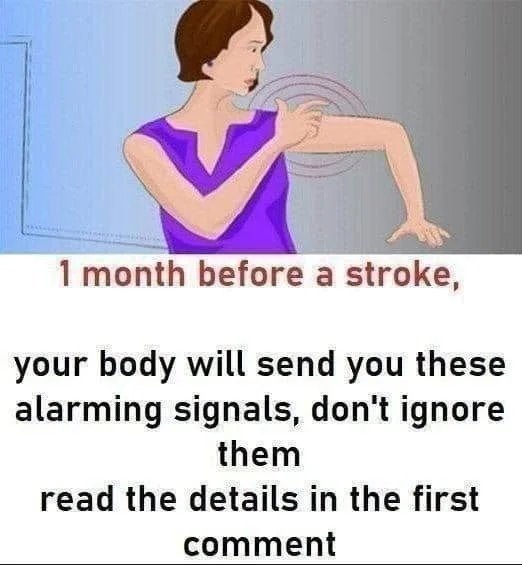A stroke can be a life-altering event, and sometimes the signs of a stroke can appear weeks or even a month before it occurs. Recognizing these early warning signs is crucial to seeking timely medical attention and potentially preventing a full-blown stroke. While many people are aware of the common symptoms of a stroke, such as sudden numbness or weakness, there are subtler signs that may show up well in advance.
Here are some key warning signs that can appear up to a month before a stroke:
1. Frequent Headaches
Headaches that are more intense or occur more frequently than usual could be a sign of an impending stroke. These headaches might feel different than your typical migraines or tension headaches, often accompanied by nausea, vision changes, or dizziness.
promoted content: Keep scrolling to continue reading
Thanks: for Continuing
- 2. Sudden Difficulty Speaking
- If you notice a sudden slurring of speech or difficulty finding the right words, it could be a sign of a mini-stroke, also known as a transient ischemic attack (TIA). These episodes are often brief, but they can signal that a full stroke may be coming.
- 3. Vision Problems
- Experiencing blurry or double vision, or even temporary loss of vision in one or both eyes, can be an early warning sign of a stroke. These changes in vision may not be accompanied by pain, making it easier to dismiss them, but they should not be ignored.
- 4. Dizziness or Loss of Balance
- Unexplained dizziness or trouble with coordination and balance, especially when walking, could indicate that a stroke is on the horizon. These symptoms may appear intermittently or persist over time.
- 5. Sudden Numbness or Weakness
- Experiencing numbness, tingling, or weakness in your face, arm, or leg (often on one side of the body) is a common symptom of a stroke. If these sensations come and go or appear without any obvious reason, it might be worth seeking medical advice.
promoted content: Keep scrolling to continue reading
Thanks: for Continuing
- 6. Fatigue and Trouble Sleeping
- Extreme tiredness or feeling fatigued without any clear reason could be a sign of stroke risk. Additionally, difficulty sleeping or experiencing changes in sleep patterns might also be a red flag, especially when combined with other symptoms.
- It’s essential to recognize these signs early and consult a healthcare professional if you experience any of them. Timely intervention can make a significant difference in preventing a stroke or minimizing its impact.
- If you or someone you know is experiencing these symptoms, don’t wait for them to worsen—contact a medical provider right away.
A stroke can be a life-altering event, and sometimes the signs of a stroke can appear weeks or even a month before it occurs. Recognizing these early warning signs is crucial to seeking timely medical attention and potentially preventing a full-blown stroke. While many people are aware of the common symptoms of a stroke, such as sudden numbness or weakness, there are subtler signs that may show up well in advance.
Here are some key warning signs that can appear up to a month before a stroke:
1. Frequent Headaches
Headaches that are more intense or occur more frequently than usual could be a sign of an impending stroke. These headaches might feel different than your typical migraines or tension headaches, often accompanied by nausea, vision changes, or dizziness.
promoted content: Keep scrolling to continue reading
Thanks: for Continuing
- 2. Sudden Difficulty Speaking
- If you notice a sudden slurring of speech or difficulty finding the right words, it could be a sign of a mini-stroke, also known as a transient ischemic attack (TIA). These episodes are often brief, but they can signal that a full stroke may be coming.
- 3. Vision Problems
- Experiencing blurry or double vision, or even temporary loss of vision in one or both eyes, can be an early warning sign of a stroke. These changes in vision may not be accompanied by pain, making it easier to dismiss them, but they should not be ignored.
- 4. Dizziness or Loss of Balance
- Unexplained dizziness or trouble with coordination and balance, especially when walking, could indicate that a stroke is on the horizon. These symptoms may appear intermittently or persist over time.
- 5. Sudden Numbness or Weakness
- Experiencing numbness, tingling, or weakness in your face, arm, or leg (often on one side of the body) is a common symptom of a stroke. If these sensations come and go or appear without any obvious reason, it might be worth seeking medical advice.
promoted content: Keep scrolling to continue reading
Thanks: for Continuing
- 6. Fatigue and Trouble Sleeping
- Extreme tiredness or feeling fatigued without any clear reason could be a sign of stroke risk. Additionally, difficulty sleeping or experiencing changes in sleep patterns might also be a red flag, especially when combined with other symptoms.
- It’s essential to recognize these signs early and consult a healthcare professional if you experience any of them. Timely intervention can make a significant difference in preventing a stroke or minimizing its impact.
- If you or someone you know is experiencing these symptoms, don’t wait for them to worsen—contact a medical provider right away.


